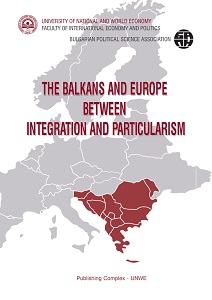Political Cooperation on the Balkans: Mission (Im)Possible?
Political Cooperation on the Balkans: Mission (Im)Possible?
Author(s): Maria Bakalova, Anton Parvanov
Subject(s): Politics / Political Sciences, Politics, Geography, Regional studies, Regional Geography, International relations/trade
Published by: Университет за национално и световно стопанство (УНСС)
Keywords: regional political cooperation; the Balkans; regional actors; external (f)actors
Summary/Abstract: It would not be an overstatement to claim that political cooperation on the Balkanshas been thwarting in the last three decades. Looking retrospectively, it becomes very conspicuoushow scarce, inconsequential or even dead-born have been the attempts at multilateral cooperationamong the Balkan states in that period. The present paper offers possible answers to the question"Why regional political cooperation on the Balkans has not marked sufficient success after the endof the Cold war?" Usually answers are sought in historical past and experience from previousinteractions and/or influence and intervention from extra-regional (f)actors. These (f)actors by nomeans should be neglected. Our claim, however, is that answers should be sought also on regionaland internal political level. In other words, in explaining the crippled efforts at all-Balkan political cooperation we look at internal political actors and the ways they might perceive externalstimuli and incentives. We argue that unlike previous historical periods when external environment and circumstances were rather unfavorable or even hostile to cooperation within the Balkans, since the beginning of the new century the external environment produces more positive incentives and stimulates political cooperation on the Balkans. Hence, the uncertain and stumblingpolitical cooperation on the Balkans is not due to external (f)actors. The emphasis on the internalpolitical actors reveals that political cooperation among Balkan states depends significantly onthe actors’ political will. Thus, the (im)possibility of Balkan political cooperation leans on theways political actors in the region perceive and interpret the signals from external environmentand communicate them back and forth to the national internal settings.
Book: The Balkans and Europe between Integration and Particularism
- Page Range: 93-106
- Page Count: 13
- Publication Year: 2019
- Language: English
- Content File-PDF

